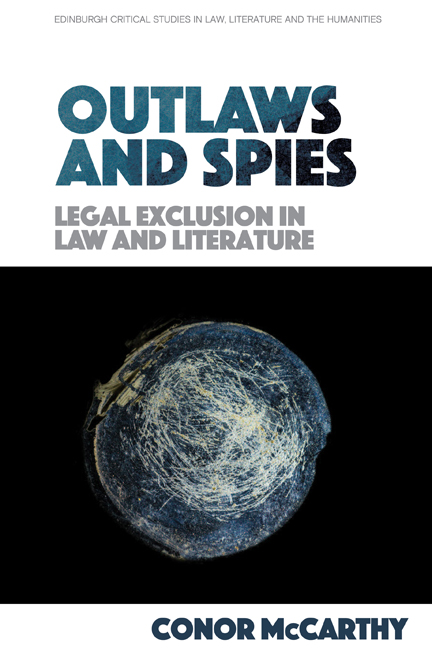Book contents
- Frontmatter
- Contents
- Acknowledgements
- Introduction
- 1 Outside the Law in the Middle Ages
- 2 Sovereign Outlaws: Shakespeare’s Second Tetralogy
- 3 The Endurance of Exclusion: Versions of Ned Kelly
- 4 ‘We’re Not Policemen’: Espionage and Law in John le Carré
- 5 ‘All Plots Tend to Move Deathward’: Plots and Consequences in Don DeLillo
- 6 Unanswered Questions: Ciaran Carson
- 7 Contesting the Virtual: William Gibson
- Conclusion
- Bibliography
- Index
4 - ‘We’re Not Policemen’: Espionage and Law in John le Carré
Published online by Cambridge University Press: 08 October 2020
- Frontmatter
- Contents
- Acknowledgements
- Introduction
- 1 Outside the Law in the Middle Ages
- 2 Sovereign Outlaws: Shakespeare’s Second Tetralogy
- 3 The Endurance of Exclusion: Versions of Ned Kelly
- 4 ‘We’re Not Policemen’: Espionage and Law in John le Carré
- 5 ‘All Plots Tend to Move Deathward’: Plots and Consequences in Don DeLillo
- 6 Unanswered Questions: Ciaran Carson
- 7 Contesting the Virtual: William Gibson
- Conclusion
- Bibliography
- Index
Summary
Our discussion until now has focused largely upon the historical practice of outlawry. We have seen that the exclusion of individuals from the protection of the law was a long-standing phenomenon, enduring in English law from the earliest medieval English legal texts through to colonial practice in nineteenth-century Australia. We have also found that the outlaw is a complex figure. Portrayed as a sort of homo sacer by the state and its legal texts, but perhaps claimed as a ‘social bandit’ by a literature celebrating his resistance to authority, the outlaw is capable of being both of these things, and more besides. The discussion so far has also emphasised that there is more to outlawry than the figure of the outlaw. We have argued that outlawry is not merely a reactive gesture by the state, but also a proactive tactic, a way in which sovereign power is asserted. Further to this, outlawry itself is only one of a variety of forms of legal exclusion employed by the state in the pursuit or defence of power. The sovereign may (and perhaps must) seek to act outside the law in defence of the state, and in that sense the sovereign is a figure who bears a surprising resemblance to the outlaw. Additionally, these exclusions of individuals from the law's protection or punishment may also intersect with broader tactics of legal exclusion aimed at entire nations, territories and legal systems.
From here on, we turn away from the historical practice of outlawry and towards the contemporary practice of espionage. On the face of it, this would seem a very different subject, and the literatures of outlawry and espionage are not conventionally considered together. But the discussion below suggests that the contemporary state too acts outside the law in the interests of power, and that one of the most significant ways in which it does so is via the creation of secret services. While not a new phenomenon, such agencies and their activities, from intelligence gathering to covert action, take on a substantial importance in the international politics of the twentieth and twenty-first centuries, particularly during the Cold War and its aftermath.
The following chapters consider ways in which the various intelligence agencies of the United Kingdom and the United States in particular may be considered to act outside the law.
- Type
- Chapter
- Information
- Outlaws and SpiesLegal Exclusion in Law and Literature, pp. 107 - 133Publisher: Edinburgh University PressPrint publication year: 2020

